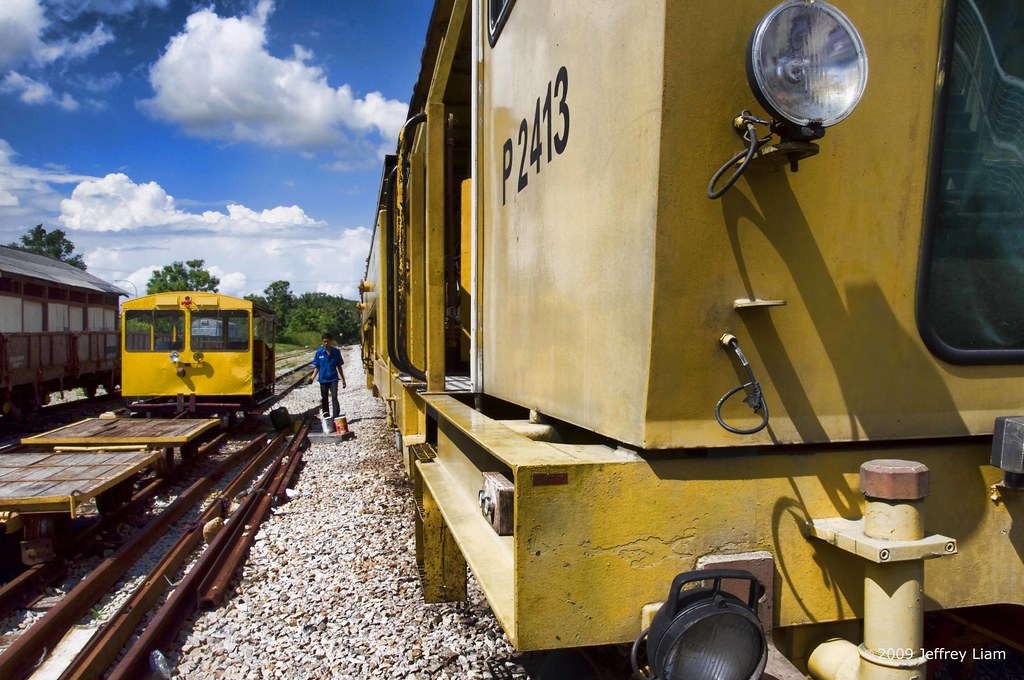Just thought I'd do my last posting for 2009 and it has been quite a year personally. Many things have happened and I have been traveling lately to a few places and taking photographs quite a fair bit. May the new year bring in more exciting adventures and that life would unravel itself in its mysterious ways...ways that are far beyond my imagination.
Stumbled upon this place whilst I was driving home and I had never thought it would be decorated this way near my home. Here it is, and a very Happy New Year!
Wednesday, December 30, 2009
Tuesday, December 15, 2009
Air Papan
The place itself was some 15 kms up north of Mersing. Can't miss it cause there were so many signages that indicate this beach, so I turned right into the small asphalt road which later turned into laterite. I have been to this place some 20 odd years ago and during that time, it was one of the popular local destination to swim and do practically nothing and perhaps have a picnic.
Well, I was a little disappointed cause when I got there, the beach was not what it used to be. It's a little dirtier and a lot less people. It's also a little commercialised. Went 4x4 on the surrounding area and found nothing really interesting. Some abandoned and badly kept chalets. Some new chalets under construction. A few lifeguards surprisingly - chatting and idling away.
Drove away a little disappointed. Found a fishing jetty on my way out. Not a single soul in sight - silence.
Thursday, December 10, 2009
Kluang Railway Station circa 1915
It was a short drive to Kluang yesterday along the highway to pick up my Ranger. Well, it was definitely old age catching up because I missed the highway exit by some 67kms ending up to detour back to Air Itam exit. Geez, that can't be me!
Arrived there around 2pm just in time to grab the local favourite "nasi lemak" and coffee at the Railway Station Coffeeshop. This was the exact same coffeeshop my parents went to since I was a kid and that casts me back some 20 odd years. Time flies I know but the place is pretty much the same since then. And cool, I had my camera too! *grin* Better capture them before too much stainless steel and aluminium creeps into the architecture.
Whacked four packets of nasi lemak and washed that down with iced tea. Here are some photos and a short note from Wiki.
The name Kluang derives from the Malay word 'keluang' which means a type of flying fox or rather a type of fruit bat. They have almost completely disappeared due to the combination of hunting and destruction of their natural habitat deforestation. Some people believed that Kluang was named after two mountains that resemble the head and wing respectively of a bat from a distance.

Railway Kluang was founded in 1915, to serve as the administrative centre for Central Johor. A railway line linking north to south Malaya was built passing through Kluang to provide the communication link to transport labor and tropical produce from Kluang and this helped in its growth since 1915. Roads were built to link Kluang to Johor Bahru towards the south, to Batu Pahat towards the north-west and to Mersing towards the east. Kluang is divided into two district councils namely Simpang Renggam District Council based at the towm of Simpang Renggam and Kluang Municipal Council based at the town of Kluang which is also the district capital. This district grew rapidly in 1920 and 1930 as a major rubber producing district.
Monday, December 7, 2009
Give These Kids Hope
HAUYMAKANG, Thailand, located north of Chiang Rai is about an hours drive from Chiang Rai Airport. This Lahu hilltribe village comprises of about 100 Lahu familes and they have been living in this area for many years.
Givekidshope.org - a non-profit Christian organisation with founders, Stephen Darby, 52 and his wife Sammy, was setup to help Lahu hilltribe children and to give hope and future. They have a 15 month old son, Matthew.
Background on Lahu Hilltribe
The Lahu hilltribe people are mainly farmers and spend a great part of their lives in the hills gathering or growing food on the hill slopes. Their children usually help in the house and farming and never get the opportunity to receive education of any kind. Most of the time, the food they have gathered for the day are hardly enough to feed the whole family.
The Lahu hilltribe people are mainly farmers and spend a great part of their lives in the hills gathering or growing food on the hill slopes. Their children usually help in the house and farming and never get the opportunity to receive education of any kind. Most of the time, the food they have gathered for the day are hardly enough to feed the whole family.
Due to extreme poverty, some of the children are sold off or sent to find work in bigger cities only to find themselves in other terrible activities such as drugs, crime and prostitution.
Girls, some as young as 12 years old, normally get married and have children the following year. Whilst this is not a norm in many cultures, this is the norm for the Lahu hilltribe people. Although new families are formed through marriage, the new couple will start farming again just like their parents did and the whole cycle continues through the next generation.
In addition to the above, the hilltribe children are not able to speak Thai and as such when they enter local Thai schools, they are left far behind in the curriculum. Hence, most drop out after much struggle at these local Thai schools.
The Challenges They Face
There are many challenges that the Lahu hilltribe people face and one main problem is that Lahu parents do not see other benefits beyond raising their children - either to continue farming or girls being married off at age of 12 years old. They certainly do not think that education can bring about hope and a better future for their children. To make things worse, most are not able to financially support sending their children to pre-school, let alone into local Thai schools subsequently.
Hence, most of the time the younger children stay at home without any proper parental supervision or without any form of education. The older children help out at the farms and begin not to see any benefits of getting an education over time.
What Has Been Done
At the moment there are about 30 children in a newly built pre-school which is located just behind the homes of Stephen and Sammy. The pre-school is the only place where the kids get some form of education before they get into local Thai schools and get to play with other kids.
There is also a playground where they spend a great deal of time enjoying themselves as kids normally should;
This is an on-going project where 8 girls will be housed together with guardians (parents) near Chiang Rai. This is scheduled to be completed by March 2010. The second phase of the project will house another 8 girls. The objective is to house these girls together so that they can encourage and support one another through their early education as well as keep these girls safe from other negative influences.
What Can Be Done
More Awareness:
The Lahu parents need to know and understand the benefits of sending their children to pre-school. They need to know that through education, there is hope for the future of their children. To know that the poverty cycle can be broken.
There must be constant effort to cultivate and nurture, not just the children but also to educate parents on the importance of education and what education means and can do for their children's future (through cases - E-Sang, 13 and Narbo, 12, both who are doing great at school now since they have attended the pre-school)
Fund-raising:
Fund-raising:
All these efforts of building a pre-school, housing for girls as well as creating the awareness to the Lahu families require funding. Whilst Givekidshope.org continues to push for a better future for these hilltribe children, this non-profit organization needs all the help they can get from everyone.
The children need textbooks, clothes, shoes, educational videos as well as toys to help them through their development at the pre-school. For those who wish to donate or sponsor a child, please visit www.givekidshope.org.
Note:
I am a free-lance photographer and the above article is a personal trip and depicts the actual condition and situation at one of the many Lahu hilltribe villages in northern Thailand. Poverty has driven the Lahu hilltribe people to deny their children of any possible education and any hope for the future. They need to be educated so that their future generations can help themselves. There is an urgent need to help them help themselves to chart their own future.
Subscribe to:
Comments (Atom)







